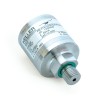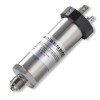When the accuracy of your pressure measurements is paramount, these digitally compensated voltage output pressure transducers deliver laboratory-grade performance. Ideal for critical research and testing environments, these transducers boast exceptional linearity, hysteresis, and repeatability, alongside minimal thermal errors. Their digitally compensated design and amplified voltage output ensure reliable and precise pressure measurements in even the most demanding applications.
 41X High Precision Low Range Pressure Transmitter
41X High Precision Low Range Pressure Transmitter DMP331i High Accuracy Pressure Transmitter
DMP331i High Accuracy Pressure Transmitter DMP333i Rangeable High Pressure Precision Transducer
DMP333i Rangeable High Pressure Precision Transducer
Find out more about High Accuracy and Precision, Voltage Signal Output Pressure Transducers to determine which product options and capabilities will best meet your application requirements.
In critical research and testing environments, where even the slightest deviation in pressure readings can impact your outcomes, high-accuracy voltage output pressure transducers are indispensable. These meticulously engineered sensors offer a combination of advanced digital compensation, robust design, and superior performance characteristics, guaranteeing the utmost precision and reliability.
Key Features
- Laboratory-Grade Accuracy: These transducers achieve accuracy levels ranging from 0.01% to 0.1% full scale (FS), providing unparalleled measurement fidelity for critical applications.
- Digital Compensation: Built-in digital compensation minimizes errors related to temperature, non-linearity, and hysteresis, ensuring consistent and accurate readings over the entire operating range.
- Amplified Voltage Output: These transducers provide a user-friendly 0 to 5 or 0 to 10 volt output signal, facilitating easy integration with data acquisition systems and other measurement devices.
- Gauge, Absolute, and Differential Pressure Measurement: These transducers offer versatility in measuring various pressure types, catering to diverse application requirements.
- Exceptional Performance Characteristics: Beyond impressive accuracy, these transducers boast excellent linearity, hysteresis, repeatability, and minimal thermal errors, further contributing to their superior performance.
- Minimal Thermal Errors: The design minimizes the impact of temperature fluctuations on measurement accuracy, ensuring consistent performance even in environments with varying temperatures.
Applications
- Research and Development: Ideal for precise pressure measurements in scientific research, laboratory experiments, and material testing applications.
- Calibration and Testing: Accurately calibrate and test other pressure measurement devices and equipment.
- Process Control: Monitor and control critical process parameters in industries where precise pressure readings are essential, such as aerospace, pharmaceuticals, and semiconductor manufacturing.
- Material Testing: Precisely measure stresses and strains during material characterization and structural analysis.
- Fluid Dynamics: Accurately monitor pressure distributions and flow characteristics in fluid systems.
- Environmental Monitoring: Reliably capture pressure data for meteorological studies, atmospheric research, and environmental monitoring.
- Aerospace and Automotive Testing: Measure pressure in wind tunnel experiments, engine test benches, and other demanding automotive and aerospace testing applications.
- High-Precision Industrial Applications: When the stakes are high, rely on these transducers for accurate pressure measurements in critical industrial settings.
Technical Terms
Brief explanations of some of the key terms used when describing the performance specifications of high accuracy voltage output pressure transdcuers:
- Digitally compensated: Advanced signal processing to reduce errors
- Full-scale accuracy: Overall precision of the transducer
- Linearity: Consistency of output signal with applied pressure
- Hysteresis: Difference in output for increasing/decreasing pressure
- Repeatability: Consistency of output for repeated pressure values
- Thermal errors: Impact of temperature on measurement accuracy
High-accuracy voltage output pressure transducers are crucial for ensuring precise pressure measurements in critical research, testing, and industrial applications. Their exceptional performance characteristics, combined with robust construction and versatility, make them a valuable asset for any demanding environment.
